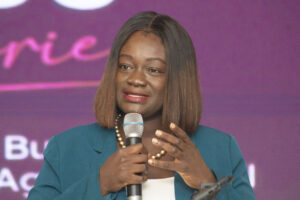By Rashidatu IBRAHIM
Speakers at the inaugural Women in Business (WIB) dialogue series, organised by the B&FT, have urged for a comprehensive commitment to fostering women-led entrepreneurship.
The calls underscore the importance of offering equal opportunities for women entrepreneurs to succeed in a supportive business environment.
Held under the theme ‘Investing in Women-Owned Businesses for Ghana’s Transformation Agenda: A Call for Action’, the session was led by notable female executives from various sectors, alongside accomplished corporate and business leaders.
In her keynote address, Kosi Yankey-Ayeh, Chief Executive Officer (CEO) of Ghana Enterprises Agency, emphasised that the theme of the event resonates deeply with Ghana’s advancement and prosperity. She acknowledged the crucial role that women-owned and led businesses play in driving economic growth, promoting innovation and nurturing vibrant communities.
She commended the contribution of women to the workforce, lauding them as innovative and actively involved in community development.
Despite the achievements of women, she acknowledged that challenges persist and need to be addressed to propel their advancement

“We cannot ignore the harsh realities and challenges they face on a daily basis. From limited access to finance and markets to cultural biases and societal norms, the road to success for female entrepreneurs is often fraught with obstacles,” she said.
However, she added that these challenges are not insurmountable. “They are simply barriers that can be overcome with collective action, determination and the right support systems in place. That is why today, I stand before you to issue a call to action—a call to invest in women-owned and led businesses not just with words, but with tangible actions, projects, programmes and interventions that will inevitably drive meaningful change.”
One of the challenges, she stressed, was access to finance, saying: “Too often, our women entrepreneurs struggle to secure the funding they need to start or grow their businesses. This is why we must work together to expand access to financial resources”.
She reiterated her organisation’s mandate to support the development and advancement of micro, small and medium-sized enterprises (MSMEs) with the backing of the government and other partners, as established by Act 1043 (2020) of Parliament.
On his part, Dr. Daniel Mckorley, founder and Chairman of the McDan Group, intimated that the economy cannot achieve meaningful growth without the contribution of women, who make up over 50.7 percent of the population in the business landscape.

He further underscored the pivotal roles women play in advancing the economic prospects of Ghana, as well as the well-being of communities, families and their own aspirations through entrepreneurship.
“Indeed, no country can ever make it in today’s world leaving half of its population on the side-lines. Our economy cannot thrive when women are not given a seat at the table.
“By empowering women to become entrepreneurs and business leaders, we unlock a vast pool of talent, creativity and innovation that drives economic growth and prosperity,” he noted.
He referenced a study conducted in developing markets, which revealed that women reinvest 90 percent of every additional dollar of income into their families’ education, health and nutrition, compared to approximately 30-40 percent for men.
Against this backdrop, he said supporting women in business is a moral and ethical imperative, adding: “When we help women to succeed, we are investing in the future of our society”.
To promote increased participation of women in entrepreneurship, Dr. Mckorley advocated heightened efforts in enhancing financial literacy skills among women. He noted that empowering women with knowledge and understanding of financial management, facilitating access to start-up funding and enabling them to make informed financial decisions would pave the way for their entrepreneurial endeavours.
“Secondly, women should not shy away from taking on risk. Accessing start-up funding through debt or equity, just like for our male counterparts, plays a vital role in fuelling business growth. Women should step out of their comfort zones and seize opportunities that may require taking calculated risks. Remember, fortune favours the brave,” he advised.
Again, he urged women to embrace mentorship programmes and establish networks—both formal and informal—that connect experienced businesswomen with aspiring entrepreneurs; thus, creating a robust support system.
This guidance and solidarity, he added, can help women navigate the challenges they may face, providing them with insights, advice and inspiration.
The business mogul also urged banks and other institutions to create dedicated funds or grant programmes specifically aimed at supporting women entrepreneurs to thrive.
Similarly, Dr. Godwin Acquaye, Chief Executive Officer of B&FT, posited that investing in women-owned businesses is not just a moral imperative, but also a strategic necessity for the sustainable development agenda of the country.

“Studies have shown that when women are empowered economically, entire communities thrive. By providing women entrepreneurs with access to capital, markets and networks, we not only enhance their businesses’ viability but also create ripple-effects that benefit society as a whole,” he said, calling on stakeholders – policy-makers, investors, corporations and communities – to prioritise and support women-owned businesses.
“Let us commit to providing equal opportunities for women entrepreneurs to thrive, innovate and lead. Let us foster an ecosystem where every woman with a dream and a vision can turn her aspirations into reality,” Dr. Acquaye further added.
Referring to statistics that underscore the status of women entrepreneurs in the country, Dr. Acquaye lamented the disproportionately low representation of women in entrepreneurship, despite data indicating that women make up approximately 46 percent of the labour force in Ghana.
Recent studies have also revealed that only about 13 percent of businesses in Ghana are owned by women. According to him, these figures highlight a significant gender gap in the entrepreneurial space that needs to be addressed.
Dr. Rejoice Wodomdedzi Foli, Consultant and UN Peace Ambassador, on her part, called for increased investments in education and skills development for women.
This, according to her, includes training on business registration procedures and insurance, tech incorporation as well as mentorship programmes to ensure sustainability.
The maiden WIB served as a platform to offer insights into harnessing the potential of women-led businesses.










